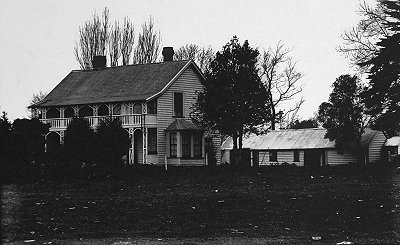
Occupying the 50 acre Rural Section 82 at Riversleigh (now part of Avonside), Wotton House overlooked the river, at the furthest reach of its quietest loop, from the early 1860s until about 1944.
Seated in front of his house, with his wife and two of his eleven children, is Fortunatus Evelyn Wright (1829-1912).
In a frontier town, where too many middle-class parvenus (with some of the veneer, but little of the substance) described themselves as "Gentleman," Forty Wright was the real McCoy. Descendant of French Dukes and the author John Evelyn (1620-1706), he was Canterbury's first Postmaster General.
Manager of the city's first Bank in 1856 and Consul for Sweden and Norway, Wright was also a director of the New Brighton Tramway Company and a Justice of the Peace.
Also among a litany of distinguished forebears was his namesake; the English privateer Fortunatus Wright (1712-1757). However, he should best be remembered for a paper that he read to the Philosophical Institute of Canterbury in 1873; On the desirability of dedicating to the people of New Zealand small areas of land assimilating in character to the village greens of England.
Newspapers took the matter up and the recreational reserves that abound within the garden city are his lasting legacy. But the recreational reserve that once formed part of the grounds of his home is named after a local politician...

Shown above in a circa 1875 photograph, the eighty year-old mansion was demolished to make way for a much smaller house in spacious grounds, where archaeological evidence of its predecessor continues to be revealed in an extensive organic garden.
The previously unidentified lower photograph is in the collection of Christchurch's Canterbury Museum.
Seated in front of his house, with his wife and two of his eleven children, is Fortunatus Evelyn Wright (1829-1912).
In a frontier town, where too many middle-class parvenus (with some of the veneer, but little of the substance) described themselves as "Gentleman," Forty Wright was the real McCoy. Descendant of French Dukes and the author John Evelyn (1620-1706), he was Canterbury's first Postmaster General.
Manager of the city's first Bank in 1856 and Consul for Sweden and Norway, Wright was also a director of the New Brighton Tramway Company and a Justice of the Peace.
Also among a litany of distinguished forebears was his namesake; the English privateer Fortunatus Wright (1712-1757). However, he should best be remembered for a paper that he read to the Philosophical Institute of Canterbury in 1873; On the desirability of dedicating to the people of New Zealand small areas of land assimilating in character to the village greens of England.
Newspapers took the matter up and the recreational reserves that abound within the garden city are his lasting legacy. But the recreational reserve that once formed part of the grounds of his home is named after a local politician...

Shown above in a circa 1875 photograph, the eighty year-old mansion was demolished to make way for a much smaller house in spacious grounds, where archaeological evidence of its predecessor continues to be revealed in an extensive organic garden.
Revised 5 October, 2008.
The previously unidentified lower photograph is in the collection of Christchurch's Canterbury Museum.
No comments:
Post a Comment